North Melbourne champion Corey McKernan on his breakout 1996 premiership season
Missing out on the 1996 Brownlow Medal is something Corey McKernan is at peace with. But there is one speculative voting call from the umpires that still grates McKernan to this day. See his take on the best season of the modern-era by a Roo.
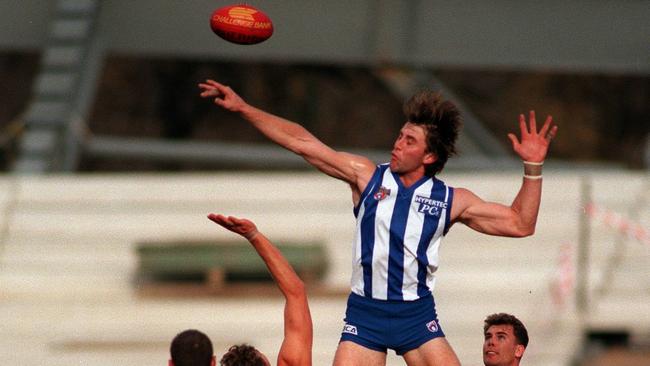
Sport
Don't miss out on the headlines from Sport. Followed categories will be added to My News.
Corey McKernan’s 1996 season was arguably the greatest by a North Melbourne player in the modern era.
McKernan answers your questions, revealing how many the premierships should have won during their dominant period, why he and Wayne Carey formed a formidable combination and how he willed himself to play in the Grand Final after a serious knee injury in the preliminary final.
Is there a position voluntary or otherwise for players like yourself and Carey to be more involved with the club? Mentoring the next generation, attending family days or keeping the culture and history of the club alive for example. I think it would be great but what about you? (from Patrick)
I have been in contact with the club since Rhys has taken over and the CEO Ben Amarfio. They’ve been amazing on how they have tapped into the rich vein of what North Melbourne is really about. They really get it. I have said at any stage if they need me I’m more than happy to help in any capacity. The appointment they’ve made in Brady Rawlings is a big one as well, he brings experience from being at an elite club like West Coast and really gets what has made North successful.
1999 Grand final second quarter, and we have surrendered the lead to a surging Carlton. Was there a change in tactics from Pagan and/or Carey, or just the natural progression of the game that saw us take control? How pumped were you after your momentum changing second quarter goals? Pretty special goals those, a 70m bomb and then a classy banana after out-marking Kouta? (from The Emu)
The second quarter in the ‘99 GF just evolved after Carlton had started pretty well. Up until then I hadn’t done a lot but when I did get my moments I made sure that I stood tall. That’s what Grand Final Day is about, you have no idea when it’s your turn but when it is make it count … could be as simple as a tackle or a set shot but in the end they all count. The ‘99 GF was different for me but I rate the game every bit as good, my key moments in ‘99 were really big moments.
Was there a time or a game in ‘96 where you thought you were unstoppable? It’s OK, you can be a bit arrogant now about it haha. (from Matt)
It was more when Wayne (Carey) and I would start forward together and walk to the forward line as the game started. To have the best player in the game in Carey and me in pretty red-hot form made it a pretty lethal combination. I don’t know what he thought but my mindset was good luck trying to cover us, as in the air and on the ground can get you.
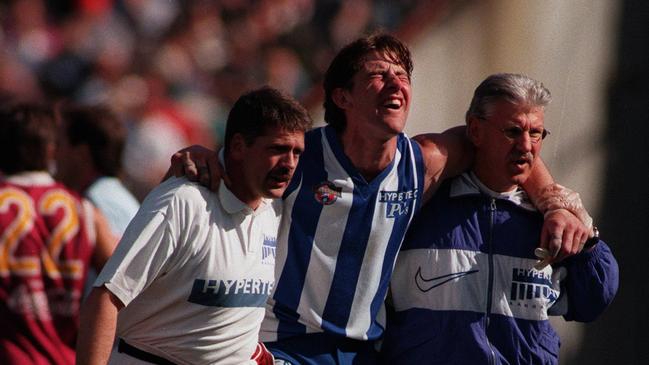
What was it like being on the ground, Round 17 1996, when the King kicked 11.2 had 31 disposals and was marking everything against the Dees? Greatest individual performance I’ve seen. (from Brent)
I kept driving him mad once I knew he was really on. Before this game I think his best was seven so when it was close I reminded him to keep going in the third quarter, which he duly obliged. That night we both played forward and between us I think we took something like 26 marks and 16 goals … you won’t lose too many times if that happens!
I was so lucky to get my hands on a ticket and fly down from Alice Springs to watch you and the boys have a great win in the 1996 Grand Final. I’m still devo about that report which cost you a deserved Brownlow but life could be a lot worse! My question is who was the most talented indigenous player you played with and against? (from Matt)
I had a few favourites that make it hard to separate and both played in the ‘99 flag. The first one was Byron Picket. He was just a brute and he might not have played a lot of footy now days given the rules on head high contact! He really had another gear with his pace and knew how to really use it. My other favourite was Winston Abraham. Winnie could literally do anything with ease, he could glide when he ran, could take a mark standing on your head and kick a torpedo from 60m out.
From the opposition I’d say Adam Goodes could really do it all. He could play on ball, ruck or key position … coupled with the longevity he had, made for a very unique player.
How many flags do you think North should have won through the 90s? (from Brent)
The par result should’ve been at least three flags for how consistent we were in making seven straight preliminary finals
Corey, at the peak of your powers you were training for football but still playing golf at a good level. If you had an obvious strength, height and athleticism advantage why would you almost always be first away on the fairway after Pete had out-driven you by 20 yards at Huntingdale?
Hah … Given that your son has oversized calves this gives him some advantages but on the whole I’d be looking back at Pete most times when he was playing first off the tee!!!
It was said by the club doctor in 1996 that if it had been any other game other than a Grand Final then Corey would have been ruled out due to injury. Remarkable effort by Corey!
I hurt my knee in the preliminary final against Brisbane and spent the week aiming to get it right for the ‘96 Grand Final. Fast forward to Wednesday and Harry Unglik and I ventured into to Vimy House in Kew. We went there to drain the fluid out of my knee which ended up being 40ml blood. Harry had concerns about my knee and said that it might not be a good idea to play. Given I trusted our medical staff super well, I did for a split second think of what he said but I said “Harry, I’m playing”. Once that decision was made I knew Harry and team would be the best to get me through. Just before quarter time a really got hammered on my knee and it was the best thing that coddle happened as I then said well if that’s as bad as it gets then I’m good to go!
*****************
YEAR OF THE ROO: COREY McKERNAN
Missing out on the 1996 Brownlow Medal is something Corey McKernan is at peace with.
If anything, McKernan has got terrific mileage from the “asterisk” as the first ineligible winner.
But one thing grates McKernan, to this day, and that is how Richmond ruckman Justin Charles — his direct opponent — was awarded the three votes for Round 22, 1996, in a six-goal loss to North Melbourne.
Relive classic AFL matches from the 60s to today on KAYO SPORTS. New to Kayo? Get your 14-day free trial & start streaming instantly >
“The only thing I was disappointed about was Round 22,” McKernan said.
“I would love to know what actually happened … I was filthy he (Charles) got three.
“They’re all going you just lost the Brownlow and I'm like, ‘No, I played on him, there is no way he got three’. Wayne Carey and Peter Bell killed it (and) we won by six goals.”
Carey kicked three goals from 21 disposals and 13 marks, and Bell tallied 30 disposals.
McKernan had a reasonable night, 19 disposals and 17 hit-outs, compared to Charles’ 23 disposals and eight hit-outs.
“There is no way he was best on ground, no way,” McKernan said.
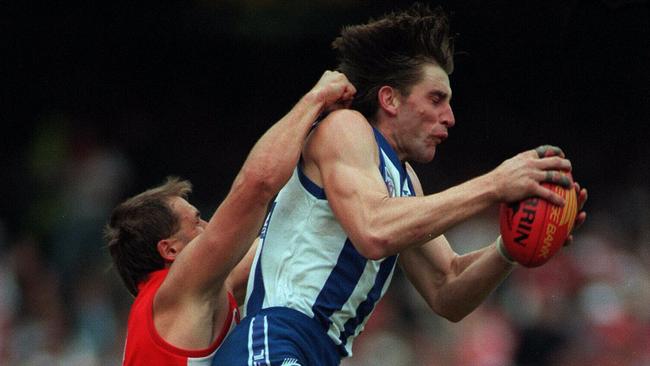
Incredibly, the Brownlow near-miss was only the second-worst thing to happen to McKernan inside 48 hours after a clash of knees in the preliminary final left him with a posterior cruciate ligament injury.
A quarter of a century on from one of the best individual seasons on record, McKernan looks back with nothing but pride, especially the adversity and uncertainty of Grand Final week.
At 22, McKernan was already All-Australian ruckman, the league’s most valuable player (Leigh Matthews Trophy) and equalled Brownlow co-winners Michael Voss and James Hird with 21 votes.
Then, two days after “30-40ml of blood” was drained out of his knee by syringe, McKernan just missed out on the Norm Smith Medal.
“I could’ve, with a bit of luck, had a Dustin Martin-type year where I could’ve literally won everything,” McKernan said.
The only blemish was that unduly rough conduct charge, and subsequent one-match suspension, for falling knees-first into the back of Geelong ruckman John Barnes after a marking contest in Round 6.
“I was mind-blowingly mad after it,” McKernan said.
“I was mad they actually reported me, not at being reported, if that makes sense, I didn't do a lot wrong.”
To lighten the mood at Arden St after Brownlow night, captain Carey gave McKernan a plastic replica Brownlow Medal from McDonalds.
“I'm looking at it now,” McKernan said, when asked about the whereabouts of the medal.
“It's wrapped around my Leigh Matthews MVP.
“For me, the MVP (voted by your peers) is worth 10 times more than anything else because it’s the players you played against every week.”
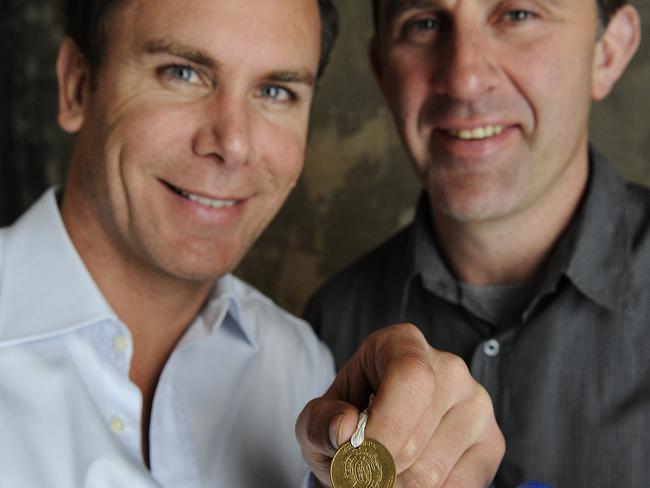
McKernan played 24 of a possible 25 games in 1996, averaged 17.6 disposals (career-high), 1.4 goals and 11.3 hit-outs across the season.
With a vice-like grip and a thumping kick, McKernan tormented his opposition.
“If I didn't play in the ruck and it was Wayne (Carey) and I walking to the forward line I'd actually have this mentality of ‘good luck you blokes … do your best to try to cover us’,” McKernan said.
“We were both playing particularly well and it was pretty rare that season where if I wasn't taking marks then Wayne was taking marks and inevitably that was leading to a lot of wins.”
It led to one AFL coach — in Grand Final week — to name McKernan the player “most clubs would take” if given the choice.
“Sure you could get (James) Hird, Kouta, (Paul) Kelly and blokes like them,” the mystery coach told the September 19, 1996 edition of the Herald Sun.
“But with McKernan, you get a big guy who can do just about anything. There's not many around.”
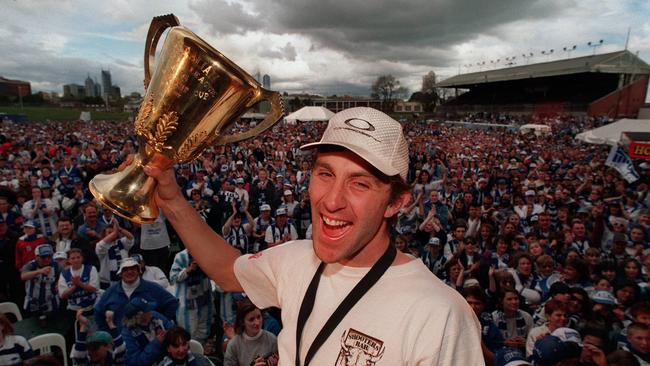
THE SPECIAL MOMENT
It felt like any other private team dinner at the MCG after training on a wintry Monday night.
The mood changed when highly-respected former North Melbourne administrator Ron Joseph was invited to speak as the Kangaroos careered towards a fourth-straight finals series.
“At the end of it he told us to follow him,” McKernan said.
“We started, I think on Level 2, walked down into the rooms, up the race and out into a dark MCG.
“We all wondered, ‘What’s going on’ and then out of hessian bag he pulled out the 1975 premiership cup.”
Joseph then invited each player to hold the club’s historic first cup and picture winning their own in September.
“Little things like that made the whole year flow on and kept the momentum going,” McKernan said.
“It made us realise how special, what we were doing (was), up to that point but the more special thing was about to come.”
THE COACH
Denis Pagan is conflicted — to this day.
As much as he loves Glenn Archer, the North Melbourne premiership mastermind believes McKernan should have won the 1996 Norm Smith Medal.
“Even though Glenn is one of my favourites, and I think they may have picked it (Norm Smith) on or before three-quarter-time back then, I just thought Corey should have won the Norm Smith,” Pagan said.
McKernan finished with 29 disposals in the Grand Final after Pagan sprung the surprise move to use his destructive ruck-forward a kick behind the play.
It allowed McKernan to expose Sydney ruckman Greg Stafford while Carey and John Blakey, playing a forward defensive role, handled Swans Andrew Dunkley and Paul Roos respectively.
Pagan’s decision, which followed a pointed quarter-time exchange with McKernan, was a masterstroke.
“I grabbed him at quarter-time and said, ‘Look Corey, if the knee is not right get off the ground now’.
“We weren’t playing for a bag full of marbles, it was Grand Final day and Corey was very indifferent in the first quarter … I probably was blunt but we were going nowhere the way it was.”

THE TEAMMATE
It would have been easy for Corey McKernan to go into his shell as a 22-year-old playing in a "star-studded team from defence to forward".
Yet McKernan rose to the challenge in 1996 to become the most influential player in the competition.
Shinboner Wayne Schwass had the best vantage point, operating at McKernan's feet at stoppages.
“There aren't many players I would say overshadowed ‘The King’ (Carey) but I would say Corey's year in ’96 cast a shadow over all of us,” Schwass said.
“That was an incredibly good football team, with a lot of top-end talent, and Corey was still relatively young compared to the rest of us.
“For him to be as dominant as he was … talks to his ability to have such an incredible impact.”
MORE AFL NEWS:
Jack Riewoldt fears no more sport will be played in 2020 due to coronavirus pandemic
Dane Swan reveals his best on-field and off-field teammates from his AFL career
Herald Sun Footy Podcast: Lauren Wood, Jon Anderson and Scott Gullan debate the big issues
The top 25 AFL draft prospects to watch in 2020 topped by the next Lance Franklin
THE RIVAL
“A cyborg version of Peter Moore.”
It was how then first-year Hawthorn ruckman Paul Salmon recalled McKernan’s 1996 campaign.
Like the Collingwood champion and dual Brownlow medallist Moore, McKernan, a diehard Magpies fan growing up, tortured opposition big men.
“He had the wet sail up that year in terms of his confidence,” Salmon said.
“Corey would just take the game on and he was very, very, very good at that.
“I don't think he was a craftsman ruckman in the pure sense, like a Justin Madden and Scott Wynd, but he was a ruckman who redefined the way the ruck (role) could be played.”
But Salmon, who finished tied for sixth in the 1996 Brownlow with 18 votes — just three behind Hird, Voss and McKernan despite missing five games — relied purely on guile to combat the North man.
“As a 31-year-old recovering ruckman (after injuries ruined his last two years at Essendon) I was nowhere near where I needed to be to take on someone of Corey's calibre,” Salmon, a two-time Bombers premiership champion and seven-time leading goalkicker said.
“I devised a tactic, which stuck with me for the rest of my rucking career, and that was drawing him to come early in the centre bounce and jump high … often he'd mistime it.
“He could jump over me probably without using his hands as leverage so to beat someone of that athleticism you have to acknowledge your own failings to be any sort of a chance.”
THE EXPERT
Corey McKernan really was a ruckman by definition only.
He won possessions and covered the ground like a rover, yet marked like an established key forward.
“We marvel at what Nic Naitanui is able to do once he has tapped it,” two-time Kangaroos premiership star-turned-Fox Footy analyst David King said.
“Nic Nat does that for what, a dozen possessions a week, Corey was doing that sort of play around the ground for 25 disposals some games, and more often than not 20.”
McKernan averaged 18 disposals in 1996, including seven 20-plus games and further five with 19.
Whereas, Naitanui has topped 20 just five times in 167 career matches.
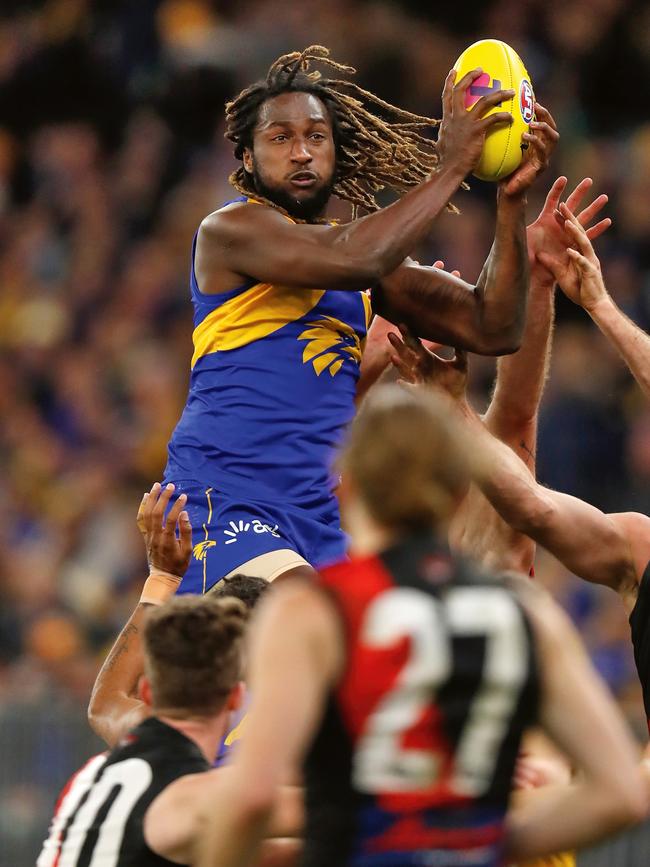
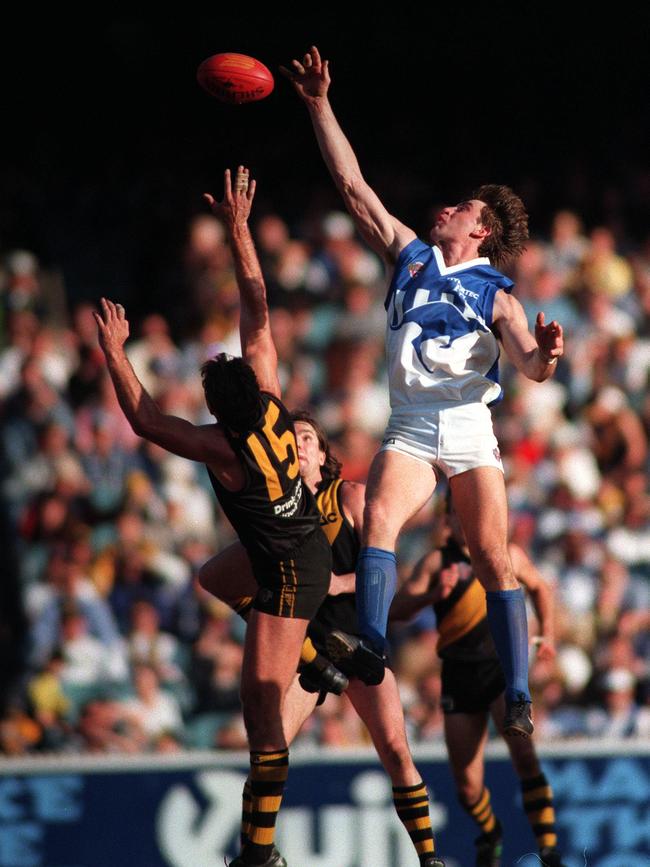
“He used to land and run … chase whatever he did,” King said.
“There wasn’t a ruckman that could go with Corey.”
Even teammates, on occasion, recoiled on having to cross paths with McKernan before and after big plays.
“You’d see him (McKernan) yell at himself,” King said.
“You’d see him psyche himself up for a centre bounce, it wasn’t quite (Peter) ‘Crackers’ Keenan level but it was certainly emotionally bubbling.
“He’d kick a big goal … and nearly break your hand on the way back high-fiving.
“The boys used to laugh, once he’s done something big don’t get in his path, he’s going to clean you up.”
LEAVE YOUR QUESTIONS FOR COREY IN THE COMMENT BOX BELOW - HE WILL ANSWER THE BEST 10 FROM NOON TOMORROW
Originally published as North Melbourne champion Corey McKernan on his breakout 1996 premiership season



